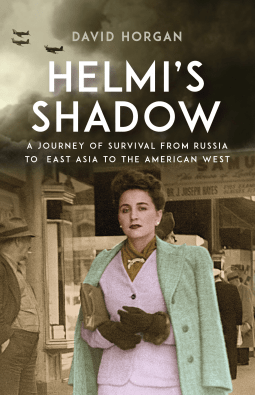I am not a fan of biographies, however, I loved this one! David Horgan is the son of Helmi of “Helmi’s Shadow” and defines the book as follows:
“This is an intimate story about my family, not a scholarly history. Nevertheless, I have made every effort to describe events, places, and people as accurately as possible. My intent is to create a portrait of the highly unusual lives of my mother and grandmother, set against some of the most tumultuous events of the twentieth century.”
Helmi’s Shadow by David Horgan
Essentially, yes, the book is exactly that but there is another dimension, harder to verbalise, that transcends this. The historical settings are hugely educational, but equally heartbreaking. The humanisation of the traumas, layer upon layer, year after year, are deeply relatable in the tumultuous 2020/21 season we’re in now. The assumptions made about Rachel and Helmi by others highlight our unconscious biases and how they work against us all. All of this is heavy. In amongst it though, as is often in life, are the lighthearted anecdotes, the friendships formed and the joyous moments.
Rachel, at the beginning, is described by her grandson as being all things peculiar. As he reflects on her life, escaping the persecution of Jews firstly in Russia and then from the Nazis, fleeing to in a part of China which subsequently fell to Japan and then was bombed as WWII closed out, my mind boggled at how such horrors were endured. It’s astonishing she kept it all together for as long as she did! Dementia is what finally results in her becoming the unravelled grandmother. I can’t imagine believing you were back in those times. But through all this, you have to admire her endurance, she just keeps on keeping on!
Helmi also has an endurance that is amazing but she is a spunky, modern woman who defines herself, engages with opportunities and takes risks such as moving round the world to America. She fulfills her dreams and raises her sons to appreciate the life they have growing up whilst sheltering them from the pain and suffering she and her mother went through. It’s only in her later years David convinces her to share what she went through and it’s those discussions which are distilled into this book.
So, yes, it’s a biography on two phenomenon lives. But it’s also a history lesson on all the parts of war that are “off-stage”, the pieces not covered in the history books of what fleeing or becoming a refugee or a stateless person actually looks and feels like. It’s hugely moving and a reminder of why we can never forget the importance of pushing back against religious, racial and cultural bias. I highly recommend it, it’s a four out five on the enJOYment scale.
I received a complimentary copy of the book from University of Nevada Press through NetGalley. The opinions expressed in this review are completely my own.

From the back cover:
Helmi’s Shadow tells the sweeping true story of two Russian Jewish refugees, a mother (Rachel Koskin) and her daughter (Helmi). With determination and courage, they survived decades of hardship in the hidden corners of war-torn Asia and journeyed across the Pacific at the end of the Second World War to become United States citizens after seeking safe harbor in the unlikely Western desert town of Reno, Nevada. This compelling narrative is also a memoir, told lovingly by Helmi’s son, David, of growing up under the wings of these strong women in an unusual American family. Rachel Koskin was a middle-class Russian Jew born in Odessa, Ukraine, in 1906. Ten years later, her family fled from the murderous pogroms against Jews in the Russian Empire eastward to Harbin, a Russian-controlled city within China’s borders on the harsh plain of Manchuria. Full of lively detail and the struggles of being stateless in a time of war, the narrative follows Rachel through her life in Harbin, which became a center of Russian culture in the Far East; the birth of her daughter, Helmi, in Kobe, Japan; their life together in the slums of Shanghai and back in Japan during the war, where they endured many more hardships; and their subsequent immigration to the United States.
This remarkable account uncovers a history of refugees living in war-torn China and Japan that to this day remains largely unknown. It is also a story of survival during a long period of upheaval and war—from the Russian Revolution to the Holocaust—and an intimate portrait of an American immigrant family. David reveals both the joys and tragedies he experienced growing up in a multicultural household in post–Second World War America with a Jewish mother, a live-in Russian grandmother, and a devout Irish Catholic American father.
As David develops a clearer awareness of the mysterious past lives of his mother and grandmother—and the impact of these events on his own understanding of the long-term effects of fear, trauma, and loss—he shows us that, even in times of peace and security, we are all shadows of our past, marked by our experiences, whether we choose to reveal them to others or not.

